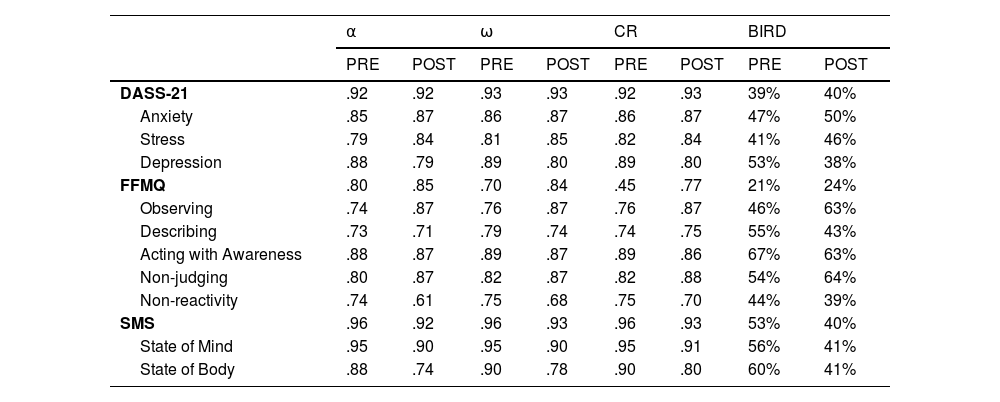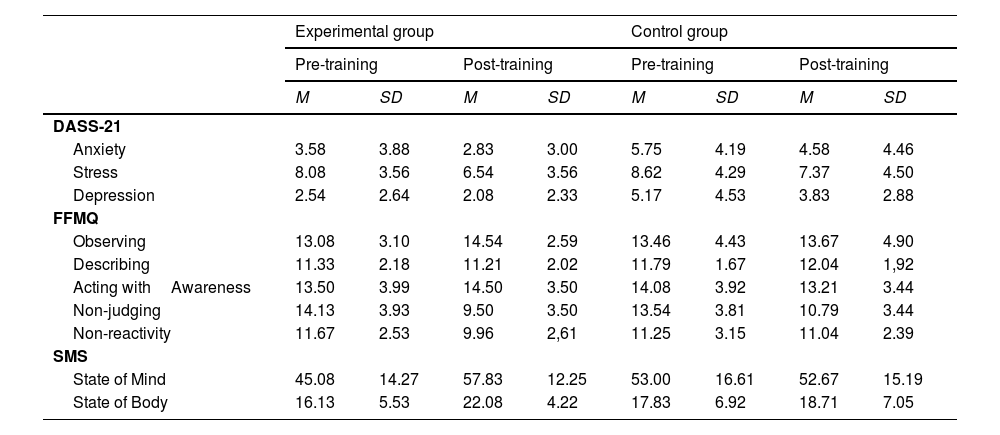To respond to external and internal demands during a therapeutic session, psychotherapists must monitor their attention. Research shows that mindfulness practice is beneficial in promoting this ability and acts as a protective agent against adverse states. However, its implementation in psychotherapist training has been limited. The aim of this pilot study was to explore the influence of mindfulness training on stress, anxiety, depression, and the mindfulness construct in trainee psychotherapists, and to examine its feasibility as part of their training. Fifty-one university students participated in the study and were divided into experimental and control groups. Pre- and post-training measures of mindfulness were considered. Both groups completed a battery of questionnaires related to adverse states and mindfulness before the training. Subsequently, the experimental group underwent nine weeks of mindfulness training. After the training, both groups completed the questionnaire battery again. The results showed that the group that underwent mindfulness training exhibited a decrease in adverse symptoms and an increase in mindfulness scores compared with the control group. These findings highlight not only the viability of incorporating mindfulness practice into the academic training of future therapists, but also its utility as a tool for personal development and the necessary skills to effectively face and develop their professional practice.
Para responder a las demandas externas e internas de una sesión terapéutica, los psicoterapeutas deben llevar a cabo un monitoreo de su atención. Las investigaciones muestran que la práctica en mindfulness resulta beneficiosa para promover esta capacidad, así como actuar de agente protector ante los estados adversos. Sin embargo, es escasa su práctica en la formación de psicoterapeutas. El objetivo del presente estudio piloto es explorar la influencia de un entrenamiento en mindfulness sobre el estrés, la ansiedad y la depresión, y en el constructo mindfulness de psicoterapeutas en formación. Analizando además su viabilidad como enseñanza dentro de la formación de estos profesionales. Cincuenta y un estudiantes universitarios han participado en este estudio piloto, divididos en grupo experimental y grupo control. Para el estudio se ha tenido en cuenta una medida pre-entrenamiento y post-entrenamiento en mindfulness. Ambos grupos, previo al entrenamiento, han contestado a una batería de cuestionarios relacionados con estados adversos y mindfulness. Posteriormente, el grupo experimental ha realizado entrenamiento en mindfulness a lo largo de nueve semanas. Finalmente, ambos grupos han respondido nuevamente a la batería de cuestionarios. Los resultados muestran que, el grupo que realizó el entrenamiento en mindfulness ha disminuido la sintomatología adversa y ha aumentado las puntuaciones en mindfulness en comparación con el grupo control. Estos hallazgos ponen de manifiesto, no sólo que la práctica del mindfulness es viable dentro de la formación académica de los futuros terapeutas, sino que es una herramienta útil que permite el desarrollo intrapersonal, así como las habilidades necesarias para afrontar y desarrollar la práctica profesional manera óptima.













